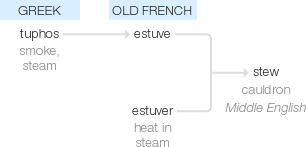Stew
Middle English (in the sense ‘cauldron’): from Old French estuve (related to estuver ‘heat in steam’), probably based on Greek tuphos ‘smoke, steam’. stew1 (sense 1 of the noun) (mid 18th century) is directly from the verb (dating from late Middle English).
wiktionary
From Middle English stewe, stue, from Anglo-Norman estouve, Old French estuve(“bath, bathhouse”) (modern French étuve), from Medieval Latin stupha, of uncertain origin. Perhaps from Vulgar Latin *extufāre, from ex- + Ancient Greek τῦφος(tûphos, “smoke, steam”), from τύφω(túphō, “to smoke”). See also Italian stufare, Portuguese estufar. Compare also Old English stuf-bæþ(“a hot-air bath, vapour bath”); see stove.
Abbreviation of steward or stewardess.
etymonline
stew (v.)
late 14c., transitive "to bathe (a person or a body part) in a steam bath," from Old French estuver "have a hot bath, plunge into a bath; stew" (Modern French étuver), of uncertain origin. Common Romanic (cognates: Spanish estufar, Italian stufare), possibly from Vulgar Latin *extufare "evaporate," from ex- "out" + *tufus "vapor, steam," from Greek typhos "smoke." Compare Old English stuf-bæþ "hot-air bath;" see stove.
Intransitive use from 1590s. Meaning "to boil slowly, to cook meat by simmering it in liquid" is attested from early 15c. The meaning "to be left to the consequences of one's actions" is from 1650s, especially in figurative expression to stew in one's own juices. Related: Stewed; stewing. Slang stewed "drunk" first attested 1737.
stew (n.)
c. 1300, "vessel for cooking," from stew (v.). Later "heated room," especially for bathing (late 14c.). The meaning "stewed meat with vegetables" is first recorded 1756. The obsolete slang meaning "brothel" (mid-14c., usually plural, stews) is from a parallel sense of "public bath house" (mid-14c.), carried over from Old French estuve "bath, bath house; bawdy house," reflecting the reputation of medieval bath houses.
